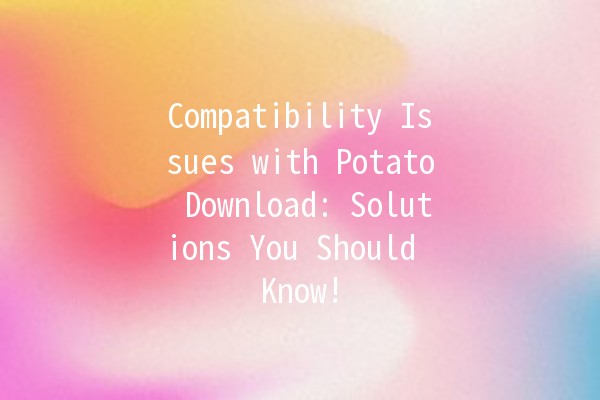In the fastpaced digital landscape, ensuring compatibility of software applications is essential for a seamless user experience. One popular tool among users is Potato, a versatile application designed for various functions. However, users often encounter compatibility issues that can hinder their productivity. In this article, we will explore the common compatibility problems with Potato and provide practical tips to overcome them.
Understanding Compatibility Issues
Compatibility issues arise when software does not function as intended on a specific platform or with a specific version of an operating system. Factors contributing to these issues may include:

Recognizing these factors will help you better understand how compatibility issues arise and how to resolve them effectively.
Five ProductivityBoosting Tips to Resolve Compatibility Issues
One of the easiest ways to mitigate compatibility problems is to ensure that you are using the latest version of both Potato and your operating system. Developers frequently release updates containing bug fixes, improved compatibility, and enhanced features.
Example: If you're using an outdated version of Potato on Windows 10, updating to the latest version can resolve many issues related to performance and usability.
Before installing or updating Potato, make sure that your system meets the minimum requirements. This includes RAM, CPU, and disk space. Running an application on a system that does not meet these requirements can lead to crashes or unresponsive behavior.
Example: If Potato requires 4GB of RAM and your device has only 2GB, consider upgrading your RAM to ensure better performance.
Both Windows and macOS offer builtin compatibility troubleshooters that can help diagnose and rectify issues automatically. If Potato isn’t running correctly, you can use these tools to find and apply the necessary fixes.
Example: In Windows, rightclick the Potato application icon, select Properties, then navigate to the Compatibility tab and select Run compatibility troubleshooter. This tool will guide you through identifying the best settings for Potato.
Sometimes, other software applications can conflict with Potato. Antivirus programs, firewalls, or even other utility applications may restrict Potato’s capabilities. Temporarily disabling them can help identify if they are the source of the issue.
Example: If Potato fails to download files, consider disabling your firewall (be cautious) and check if the issue persists. If disabling it resolves the problem, adding Potato to your firewall's allowed list should prevent future conflicts.
If you're running an older version of Potato on a newer operating system, you can often resolve issues by running the application in compatibility mode. This makes the application think it is running on an older version of the operating system.
Example: For Windows users, find Potato in the start menu, rightclick it, select Properties, go to the Compatibility tab, and choose an earlier version of Windows from the Compatibility mode section.
Common Compatibility Questions
Potato may crash on startup due to incompatible software, insufficient system resources, or configuration issues. First, ensure that your system meets the minimum requirements and that Potato is the latest version. Additionally, check for any background applications that might conflict with Potato.
Yes, Potato may be compatible with older versions of Windows; however, its functionality may be limited. Using the compatibility mode feature can help improve performance on older systems.
You can check for driver updates through the Device Manager on Windows. Rightclick on the Start menu, select Device Manager, and expand the categories to find drivers. Rightclick on each driver and select Update driver. For macOS users, updating the entire system via Software Update is advisable.
If Potato fails to download files, check your internet connection and firewall settings. Ensure your antivirus software is not blocking Potato, and consider using the compatibility troubleshooter to diagnose any underlying issues.
Yes, there are several alternatives to Potato, such as XYZ Downloader or ABC App. Researching and testing these applications can help you find one that meets your specific needs without compatibility issues.
Most applications, including Potato, usually have a feedback or support section within their software or on their official website. It's encouraged to report any discovered compatibility problems to help improve future versions.
Navigating compatibility issues with software like Potato can be a challenge, but with the right approach, you can enhance your experience. By keeping your software updated, checking system requirements, using compatibility tools, and being aware of potential conflicts, you can eliminate many common problems. This proactive approach not only boosts your productivity but also ensures that you can leverage the full potential of Potato.
By following the tips outlined in this article, you’ll be wellequipped to tackle any compatibility issues that arise and can continue to enjoy the features that Potato offers!